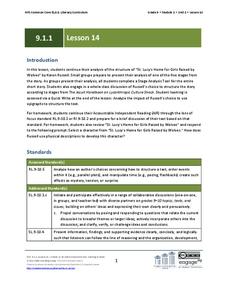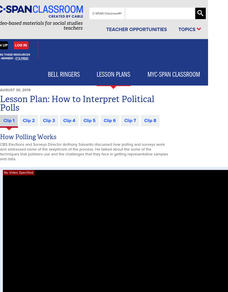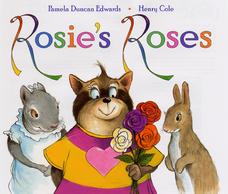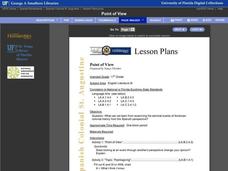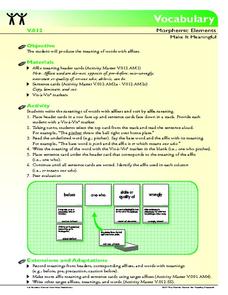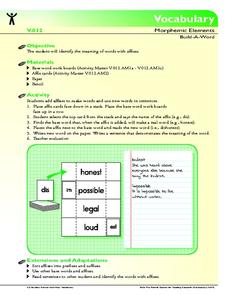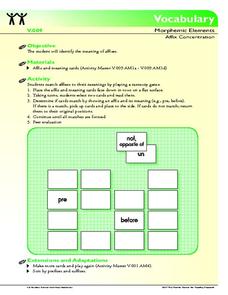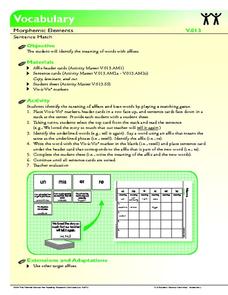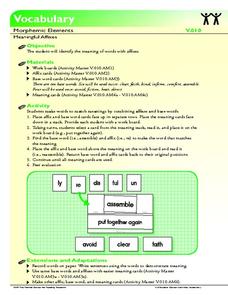Novelinks
The Little Prince: Concept/Vocab Analysis
Focus on the literary elements of Antoine de Saint-Exupéry's The Little Prince with a concept analysis sheet. With suggestions and explanations for many of the book's concepts, vocabulary, and other issues that may arise in...
Lied Center of Kansas
The Ugly Duckling and The Tortoise and the Hare
Both The Ugly Duckling and The Tortoise and the Hare are great additions to an elementary language arts lesson plan. Young readers focus on the literary elements of each story, including characters and plot development, and...
EngageNY
Grade 9 ELA Module 1, Unit 1, Lesson 14
Karen Russell's short story "St. Lucy's Home for Girls Raised by Wolves" has a unique structure that adds value to the story. With the fourteenth activity in a unit about literary analysis and textual support, analyze how Russell has...
Novelinks
The View From Saturday: Concept/Vocabulary Analysis
Design your unit on The View From Saturday by E.L. Konigsburg with a concept and vocabulary analysis resource. It outlines the plot, literary elements, vocabulary issues, and any possible considerations for planning a differentiated...
EngageNY
What Makes a Myth a Myth? Comparing “Cronus” and “Shrouded in Myth”
Scholars complete a Venn diagram to compare and contrast Cronus and Shrouded in Myth. Learners work in their triads to write similarities and differences on sticky notes. They then take a look at the text The Key Elements of...
C-SPAN
How to Interpret Political Polls
While numbers don't lie, the reliability of information in a poll may be difficult to discern. After viewing video clips with polling experts, young scholars consider how polls work and the elements of a reliable poll. Extension...
Curated OER
Rosie's Roses
Based on the alliterative book Rosie's Roses by Pamela Duncan Edwards, here is a resource to reinforce phonics and alliteration for younger readers. Several suggested activities would easily adapt to other books. Sparse procedural details.
National Wildlife Federation
What's Your Habitat?
How do human habitats compare to animal habitats? Individuals begin their nature discovery by drawing their own habitats that extend beyond their houses. Pupils ensure their drawings include the four habitat elements of food, water,...
Curated OER
Point of View
Class members examine depictions of Thanksgiving in various mediums and discuss how point of view influences the composition and presentation of the work. While the focus here is on important events in American history as seen from the...
Curated OER
A Mysterious Story Poem
Your scholars will be hooked after reading the cryptic narrative poem "The Listeners." They explain why it is so mysterious, then use the poem to learn about pronouns. Learners read an excerpt from the poem that has been altered to...
Curated OER
Tension: Creative Writing
“Desire + Danger = Tension.” Thus begins a PowerPoint that details how to create tension and maintain the reader’s interest in a story. Although text-heavy, the color-coded slides model how the D + D = T formula functions and the...
Florida Center for Reading Research
Vocabulary: Morphic Elements, Compound Word Trivia
Engage young learners in expanding their vocabulary with a fun game. Scholars learn how compound words provide clues about the meaning of unfamiliar vocabulary. Pairs take turns reading a definition, locating its corresponding compound...
Florida Center for Reading Research
Vocabulary: Morphemic Elements, Getting to the Root of It
Young readers learn how to get at the root of new vocabulary with this fun language arts activity. When working in pairs, children begin by matching unknown vocabulary words to their Greek or Latin roots. When all the vocabulary cards...
Florida Center for Reading Research
Vocabulary: Morphemic Elements, Make It Meaningful
Scholars learn to find meaning in words using affixes with a language arts activity. In pairs, children sort cards with printed sentences that include words with the prefixes mis- and pre- and the suffixes -er, -ness, and -able. Then,...
Florida Center for Reading Research
Vocabulary: Morphemic Elements, Root-O!
Young readers get to the root of unfamiliar vocabulary with a collaborative learning activity. Given a deck of root word cards and copies of a graphic organizer, pairs of students take turns flipping over cards and brainstorming...
Florida Center for Reading Research
Vocabulary: Morphemic Elements, Root-A-Word
In pairs, scholars draw cards, read the word, and identify its root. Learners place the card on a tree-themed worksheet to sort words by their roots.
Florida Center for Reading Research
Vocabulary: Morphemic Elements, Affix Match
Play a quick game of memory, but with a grammatical twist! Learners match the affixes to their meanings.
Florida Center for Reading Research
Vocabulary: Morphemic Elements: Affix Action
Make a game out of word parts. Pupils work in pairs to advance along the board. One partner reads a sentence from a card, and the other identifies the correct affix that fits with a word in that sentence.
Florida Center for Reading Research
Vocabulary: Morphemic Elements, Build-A-Word
An affix plus a base word equals what? A new word! Invite your class members to discover words using affixes and base words. Learners then write sentences using the real words that they put together.
Florida Center for Reading Research
Vocabulary: Morphemic Elements, Affix Concentration
Ask your class to concentrate their energy on affixes! Pupils match various affixes to their meanings in a memory-style game until all the cards have been gathered.
Florida Center for Reading Research
Vocabulary: Morphemic Elements, Sentence Match
Ask your class to puzzle out the meaning of various affixes. Learners read sentences and develop a new word with an affix to replace the underlined words. They write down the words and help to categorize them by affix.
Florida Center for Reading Research
Vocabulary: Morphemic Elements, Meaningful Affixes
Invite learners to determine which affix and base word combinations create new words. This activity allows pupils to play around and create words that match specific meanings.
Florida Center for Reading Research
Vocabulary Morphemic Elements: Word Dissect
Assist pupils as they learn to separate base words and affixes and combine them to determine the meaning of words. Partners practice with cards that include words with affixes.
Have Fun Teaching
Silly Stories
Young writers get a jump start on story telling by selecting a plot, a setting, and multiple character cards and then use these basic elements to create a tale.
Other popular searches
- Story Elements
- Literary Elements
- Elements of Drama
- Elements of Art
- Elements of Poetry
- Periodic Table of Elements
- Narrative Elements
- Dance Elements
- Short Story Elements
- Elements of Design
- Fashion Design Elements
- Atoms and Elements


